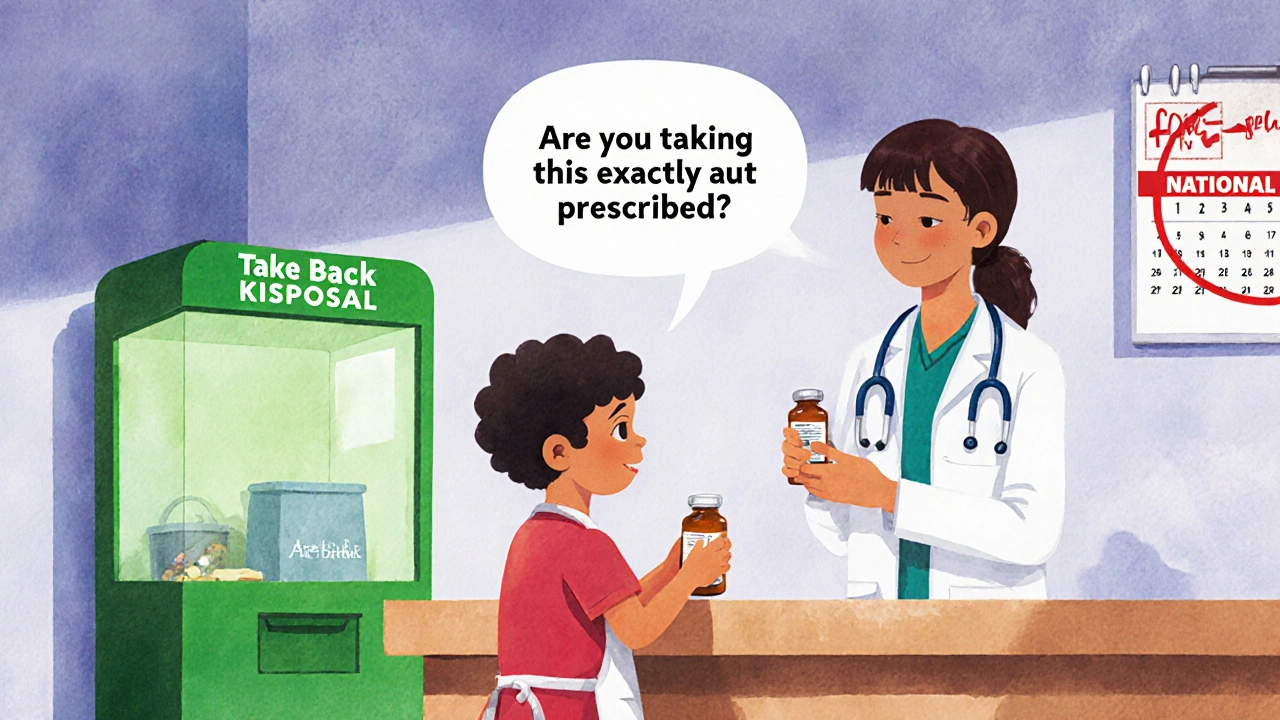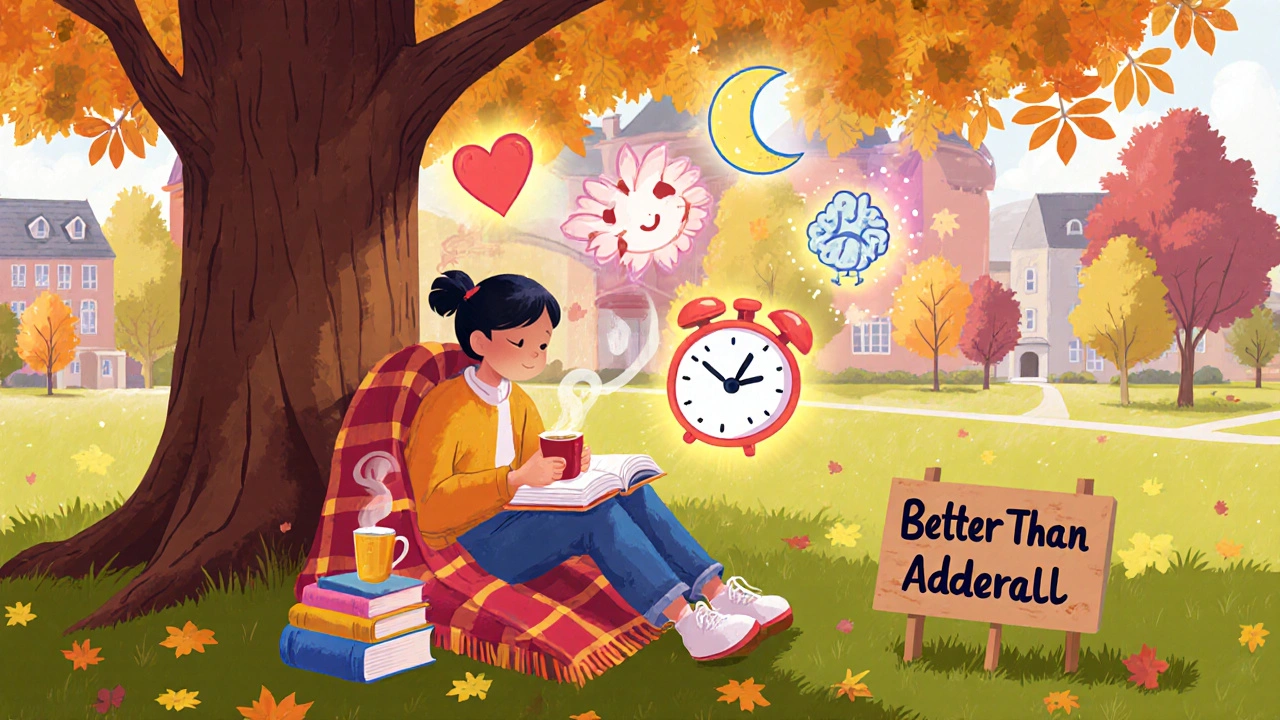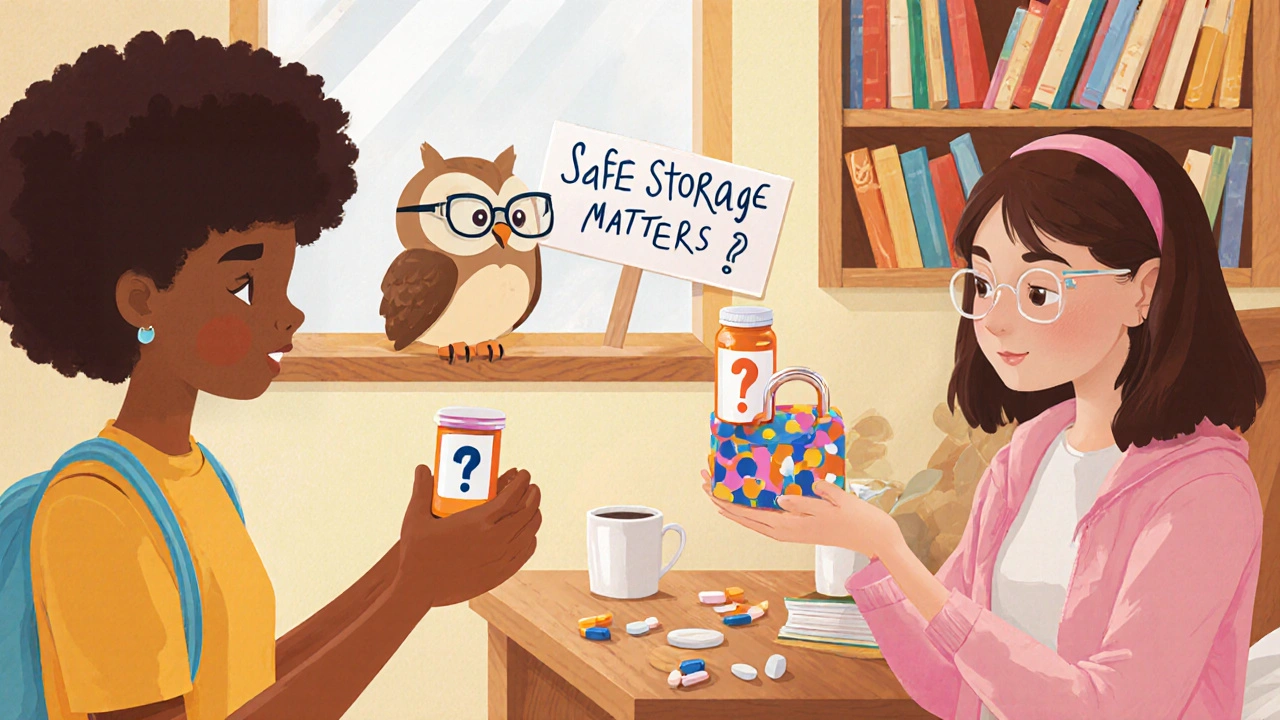Every year, thousands of college students start taking prescription meds for the first time-whether it’s Adderall for focus, Xanax for anxiety, or painkillers after an injury. But here’s the thing: medication safety isn’t just about taking your pills correctly. It’s about knowing who you’re sharing them with, where you’re storing them, and what happens when you use someone else’s prescription. And for young adults, the risks are higher than most realize.
Why College Students Are at Higher Risk
Young adults between 18 and 25 are the most likely age group to misuse prescription drugs. According to the National Survey on Drug Use and Health, nearly 14% of college students reported misusing a prescription medication in the past year. That’s not just a few people in a dorm-it’s one in seven. The biggest culprit? Stimulants like Adderall and Ritalin. Around 75% of all prescription drug misuse among students involves these drugs, usually taken to stay awake, cram for exams, or boost focus. But it’s not about laziness. It’s pressure. A 2019 study from the University of Texas found that academic stress, irregular sleep, and a culture that normalizes “study aids” are the real drivers. Students aren’t popping pills for fun-they’re trying to keep up. And it’s working, at least short-term. But the cost? Increased heart rate, panic attacks, insomnia, and worse-dependence. Emergency room visits linked to stimulant misuse tripled between 2005 and 2010. And that’s before the pandemic made mental health struggles even more common.Where Do These Pills Come From?
Most students don’t buy Adderall off the street. They get it from friends. A 2021 study of 312 college students found that 60% of misused prescriptions came from classmates, roommates, or siblings. Someone gets a prescription for ADHD, shares a few pills with a stressed-out friend, and it becomes routine. “It’s just a pill,” they say. “It’s legal.” But here’s the truth: if you don’t have a prescription, it’s not legal. And it’s not safe. Prescription meds are dosed for specific body types, medical histories, and conditions. Taking someone else’s Adderall when you’ve never been diagnosed with ADHD can trigger heart rhythm problems, severe anxiety, or even psychosis. And if you’re mixing it with caffeine, energy drinks, or alcohol? You’re playing Russian roulette with your nervous system.Stimulants Aren’t the Only Problem
While stimulants get the most attention, other drugs are just as dangerous. Painkillers like OxyContin and Vicodin, though less common now than a decade ago, still circulate on campus. Sedatives like Xanax and Klonopin are often used to calm nerves before exams or parties. But these drugs slow your breathing. Combine them with alcohol-a common mix at parties-and you’re risking overdose. In fact, the CDC reports that young adults aged 18-25 are the most likely group to die from prescription opioid overdoses. And here’s something most students don’t think about: if you’re taking a prescription drug without a doctor’s supervision, you’re not just risking your health-you’re breaking the law. Possessing someone else’s prescription is a felony in most states. Getting caught can mean losing financial aid, scholarships, or even being suspended from school.
What About Storage and Disposal?
If you’re prescribed medication, how you store it matters just as much as how you take it. Leaving pills on your nightstand, in your backpack, or in a shared bathroom cabinet? That’s how they end up in the wrong hands. A 2020 survey at UC campuses found that 42% of students knew where to get stimulants without a prescription on campus-because they were easily accessible. The fix? Lock them up. A simple medicine lockbox, available for under $20 at any pharmacy, can make a huge difference. The University of Florida’s “Safe Meds” program gave out free lockboxes and saw stimulant misuse drop by 18% in two years. It’s not magic-it’s basic security. And what do you do with leftover pills? Don’t flush them. Don’t toss them in the trash. Many pharmacies now offer free take-back kiosks. The FDA and DEA both recommend these disposal bins. If your campus doesn’t have one, ask your student health center to install one. Simple solutions save lives.What Schools Are Doing Right
Some colleges are stepping up. The University of Michigan’s “Wolverine Wellness” program doesn’t just hand out flyers. It pairs medication safety education with free academic coaching. Students who feel overwhelmed can get help with time management, study skills, and stress reduction-without needing a pill. The result? A 22% drop in stimulant misuse and a 47% increase in students using tutoring services. Other schools are training pharmacists to spot at-risk students during routine visits. Since 2021, the American Association of Colleges of Pharmacy has required all pharmacy students to learn how to identify signs of misuse. That means when you pick up your prescription, your pharmacist might ask: “Are you taking this exactly as prescribed?” It’s not judgment-it’s care. And the government is helping too. In 2023, the Biden administration allocated $25 million in grants specifically for campus medication safety programs. More schools now have dedicated medication safety coordinators-up from 28% in 2010 to 73% today.
What You Can Do Today
You don’t need a campus program to protect yourself. Here’s what actually works:- Never share your meds. Even if you think your friend “needs it more.”
- Store your prescriptions in a lockbox. Even if you live with roommates.
- Dispose of unused pills properly. Use a pharmacy drop-off or campus kiosk.
- Know the signs of misuse. If you’re sleeping less, feeling jittery, or anxious after taking a pill-it’s not normal.
- Ask for help. If you’re overwhelmed, talk to a counselor. If you’re already using someone else’s pills, talk to your doctor. There’s no shame in needing support.
It’s Not Just About Pills
Medication safety isn’t just about avoiding bad choices. It’s about building healthier habits. Sleep more. Eat regularly. Move your body. Use campus resources like tutoring, therapy, and wellness workshops. These aren’t luxuries-they’re tools. And they work better than any stimulant ever will. The truth? You don’t need to be superhuman to succeed in college. You just need to be consistent. And if you’re taking pills that aren’t yours, you’re not just risking your health-you’re risking your future.Is it illegal to take someone else’s prescription medication?
Yes. Even if the medication is legal when prescribed by a doctor, possessing or using someone else’s prescription is illegal under federal law. It’s classified as a controlled substance offense and can lead to fines, criminal charges, or disciplinary action from your school, including suspension or loss of financial aid.
Can Adderall really be dangerous if I don’t have ADHD?
Absolutely. Adderall increases heart rate and blood pressure. For someone without ADHD, it can cause severe anxiety, insomnia, heart palpitations, and even heart attacks. Studies show stimulant misuse is linked to a threefold increase in emergency room visits among young adults. It’s not a cognitive enhancer-it’s a stimulant drug with serious side effects.
How do I know if I’m becoming dependent on my medication?
Signs include needing more than prescribed to feel the same effect, feeling anxious or irritable when you miss a dose, hiding your use from others, or relying on it to function normally-even for basic tasks like studying or sleeping. If you’re unsure, talk to your doctor or campus health center. Dependence is treatable, especially when caught early.
What should I do if I find my roommate’s pills?
Don’t take them. Don’t leave them out in the open. Secure them and tell your roommate you found them. If they’re uncomfortable talking about it, encourage them to speak with a counselor or campus health provider. If you’re worried about their safety, contact your school’s health services anonymously. Your action could prevent an overdose.
Are there safe alternatives to stimulants for studying?
Yes. The most effective ones are proven, not pharmaceutical. Get 7-8 hours of sleep. Use active recall and spaced repetition for studying. Take 10-minute movement breaks every hour. Eat protein-rich meals. Avoid energy drinks. Many campuses offer free academic coaching, time management workshops, and mindfulness sessions-all proven to improve focus without drugs.
Where can I safely dispose of unused medication on campus?
Most college health centers and campus pharmacies now have medication disposal kiosks. If yours doesn’t, check with your local pharmacy-many offer free take-back programs. You can also use the DEA’s National Prescription Drug Take Back Day, held twice a year. Never flush pills or throw them in the trash-this contaminates water and puts others at risk.


Okay but like, who even cares? Everyone knows people take Adderall to survive finals. It’s not rocket science.
I’ve worked in campus health for over a decade, and this post nails it. The real issue isn’t the pills-it’s the lack of accessible, non-judgmental support systems. Students aren’t lazy; they’re overwhelmed. What we need isn’t more warnings, but more counselors, sleep workshops, and quiet study zones. Lockboxes help, but they’re a band-aid. We need systemic change.
While I appreciate the intent here, the tone feels paternalistic. Telling students to ‘just sleep more’ ignores structural issues-part-time jobs, food insecurity, housing instability, and mental health care deserts. A lockbox won’t fix a system that pushes kids to the brink. This reads like a PR pamphlet from a university admin who’s never pulled an all-nighter while working two jobs.
Wait-you’re telling me I shouldn’t share my Ritalin with my roommate who’s failing bio? Bro, he’s got a 1.9 GPA and a 12-hour shift at Target. I’ve got 3 extra pills. What’s the harm? He’s not gonna OD-he’s just trying to get through the week. You’re acting like we’re all in a meth lab.
From a clinical perspective, the data presented is accurate and statistically significant. Prescription stimulant misuse among emergent adults constitutes a public health imperative, particularly given the neurochemical dysregulation associated with non-indicated use. The dopaminergic surge induced by amphetamine derivatives in neurotypical individuals precipitates tolerance, downregulation of receptor density, and subsequent withdrawal-induced executive dysfunction. Furthermore, polypharmacological interactions with caffeine-particularly in energy drink form-exacerbate QT prolongation risk, per FDA Adverse Event Reporting System data. Institutional interventions, such as pharmacist-led screening and secure storage protocols, demonstrate measurable efficacy in reducing incidence rates. The emphasis on behavioral alternatives is not merely idealistic-it is evidence-based.
Oh wow. So we’re back to ‘just sleep more’ as the cure-all? 🤦♀️✨ Let me grab my yoga mat and my chia seeds while I’m at it. Meanwhile, the real problem is that we’ve turned college into a productivity cult and then punished students for trying to survive it. 🌱💊 You want to reduce misuse? Stop glorifying burnout. Stop making 18-year-olds choose between rent and rent-a-brain. And for god’s sake, stop pretending this is about ‘safety’ when it’s really about control.
...I found my roommate's Xanax bottle under his bed last week... I didn't take it... but I also didn't say anything... I'm scared to... what if he's gonna OD? I don't know what to do... please help...
You’re not alone. If you’re comfortable, reach out to your campus health center anonymously-they have confidential reporting lines. If not, leave a note next to his door: ‘Found this. I care. Talk to someone.’ Sometimes that’s enough to start a conversation. You did the right thing by not taking them. That matters.